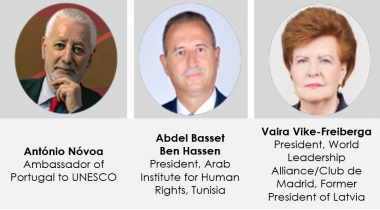Webinars on the Futures of Humanity and the Planet: Learning to Become
The current global pandemic has changed anticipated futures across the globe. The COVID-19 crisis is both world-shattering and world-making—there is a widely shared sense that humanity is at a defining moment for rethinking the future.
Reflection on probable/anticipated and possible/alternative futures is well underway within UNESCO’s Futures of Education: Learning to Become initiative and this series of webinars further explores the possible deep and fundamental transformations in how societies, politics, economies and even cultures may be organized in the future.
to reimagine development, knowledge and learning
in a world of profound transformations.
Upcoming webinars
Webinar #3 (FR): "Protéger et transformer l'éducation pour des futurs partagés et une humanité en commun"
Wednesday 20 May 2020, 15h00-16h00 (Paris time)
Advance registration is requested but not required - Click here to register: https://forms.gle/ggkNvS1xFfKuSyqy9

Please return to this page on Wednesday to access the link directing to the webinar
Overview
What deep and fundamental transformations are possible for the future organization of societies, politics, economies, and even cultures? What role can education play to facilitate these transformations? Please join three members of UNESCO's International Commission on the Futures of Education for a discussion on how to protect and transform education for shared futures and common humanity. Please note that this event will take place in French without interpretation.
Speakers
-
Vaira Vike-Freiberga (President, World Leadership Alliance/Club de Madrid, Former President of Latvia)
-
Abdel Basset Ben Hassen (President, Arab Institute for Human Rights, Tunisia)
-
António Nóvoa (Ambassador of Portugal to UNESCO)
Past webinars
20 April 2020, 11h00-12h30 (Santiago time)
The repercussions and consequences produced by the global pandemic have highlighted the increasingly pressing need to rethink the probable, possible and alternative futures that humanity could face, including the futures of education.
This webinar, co-organized with the UNESCO Regional Bureau for Education in Latin America and the Caribbean and Fundación Santillana, addressed issues related to the importance and relevance of formal education that is taught in the traditional school environment, the participation of fathers, mothers and communities, and its change during the health pandemic, the future of distance learning and its role in the transformation of education and in the fight against growing inequalities in educational opportunities.
Three members of the International Commission on the Futures of Education sparked the conversation with over 800 attendees: Elisa Guerra, founder of Colegio Valle from Philadelphia in Mexico; Tarcila Rivera, Executive Director of the Center for Indigenous Cultures of Peru; and. Antonio Nóvoa, current ambassador of Portugal to UNESCO.
24 March 2020 15h00-16h30 (Paris time)
The fact that we live in a world of increasing complexity, uncertainty, and precarity has become undeniably evident because of the COVID-19 crisis. Events around the globe are being shifted online, including a 24 March keynote panel that was to be held at the Comparative and International Education Society’s (CIES) annual conference in Miami.
Four members of the International Commission on the Futures of Education took part in the discussion with the audience: Arjun Appadurai, Professor, New York University, and Hertie School (Germany); Fernando M. Reimers, Professor, Harvard Graduate School of Education (USA); Karen Mundy, Professor, Ontario Institute for the Study of Education (Canada) and António Nóvoa, Ambassador of Portugal to UNESCO.
Though all four panelists spoke at length about the dangers and uncertainties that the current global health crisis presents, there was also firm agreement that this is a potent moment of great opportunity as well.